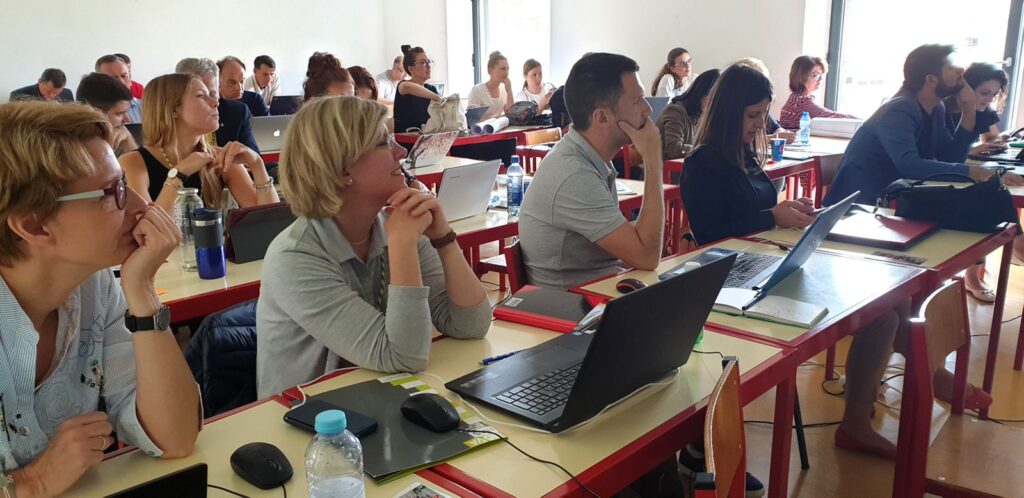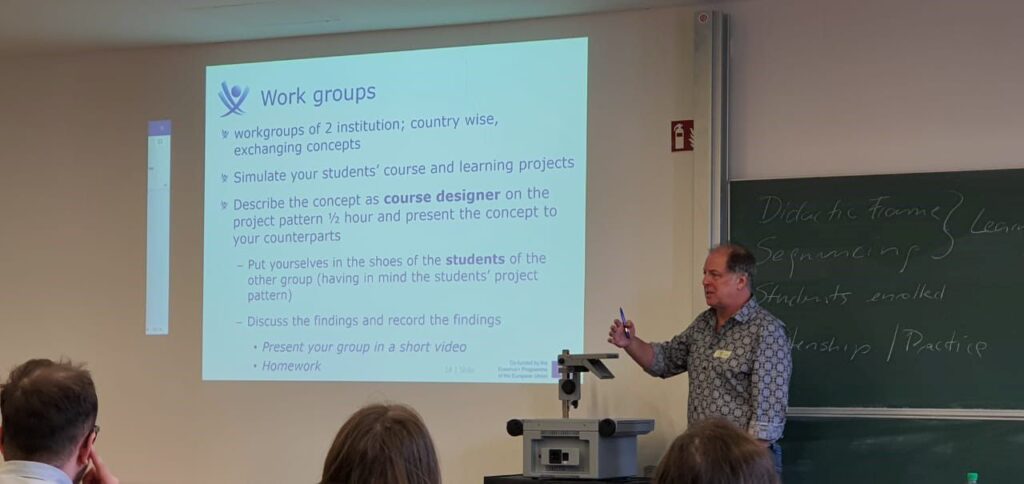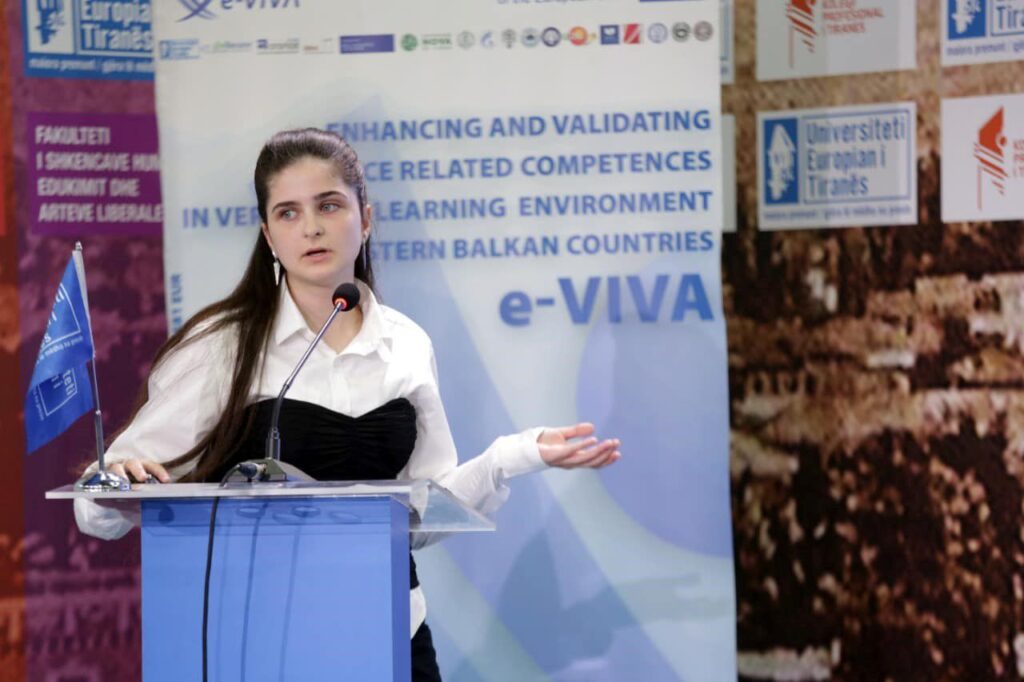The contribution of the European project E-VIVA, in building the capacities of the universities of the Western Balkans
Dr. Ketrina Mijo Çabiri
Prof. Dr. Ermira Qosja
In the framework of the International Week at the European University of Tirana was held “Transnational Dissemination Conference” in the framework of the Erasmus + e – VIVA project.
The project manager, Dr. Ketrina Çabiri, in her speech brought to the attention of those present, representatives of Western Balkan universities and students involved in it, the successive phases of this project, the difficulties overcome by all partners together during the pandemic, and highlighted the spaces created through European Commission projects for cooperation, innovation and capacity building in the Balkan SAIs.
The concluding conference focused on the presentation of the final findings and recommendations of the project, as well as the presentation of ideas and business plans of students from Western Balkan universities participating in this project.

E-VIVA Project Focus: Creating a Hybrid Learning Approach
Since the 1990s, higher education institutions in the Western Balkans have made continuous efforts to reform themselves through processes aimed at integrating them into the European Higher Education Area. Implementing structural reforms in Higher Education is always a process that carries risk and uncertainty. These processes start centrally, but implementation responsibilities are and should be shared between all partners at different levels of Higher Education.
With the implementation of the Bologna system in 2003, a number of changes took place, some positive and some that needed more contextualization. However, the Bologna Process brought, among other things, an increase in the number of students, thus achieving the objective of massification of Higher Education, but at the same time revealing a series of problems which converge on a common point: quality.
The Bologna process uses the concept of competence as a basis for learning outcomes, and this is already the most appropriate way to formulate study programs, but at the same time it is a complex process that requires capacity building within HEIs.
Society is moving in one direction, where we are all operating in an increasingly rich and personalized work environment. This requires new and different competencies, both for professors and students. A change is required from a formalized, structured, subject-oriented approach to a more informal, demand-oriented, needs-driven and personalized learning model.
In a time of unlimited access to information, knowledge, facts, the main task of educators is no longer simply to process knowledge, but to facilitate and manage the competencies of their students. Sustainable development and social cohesion depend critically on the competencies of the entire population. Competence, composed of knowledge, skills and attitudes, is a dynamic concept, which develops through the learning process.
The e-VIVA project aims to create a mix of learning approach, to facilitate and validate the development of service-related competencies, in informal university and workplace learning contexts. Through the e-VIVA project, competencies related to the service are acquired based on: Entrecomp – the competence scheme for entrepreneurship of the European Commission; strong focus on customers and their needs; innovative teaching and learning approaches, based on a Design Thinking approach; mixed teaching instruments (F2F – e-learning – projects); validation of competencies through Level 5.
The research methodology in the e-Viva project was developed to identify, analyze and describe the situation in the curricula and in practice, in relation to service orientation. The focus was on the link between formal and non-formal learning in HEIs, and possible links to validation practices related to EQF, NQF and related instruments – ECTS, ECVET and EUROPASS.
This was served by Package 1 of the project aimed at research and needs analysis – led by the University of Duisburg-Essen; Package 2 – Access to service-related learning competencies (including validation) led by Blinc eG, as well as university focus groups for each PB country involved in the project, during the November 2021 meeting in Kotor – Montenegro .

The findings of this project were very diverse, as the Western Balkan countries lack qualified professionals, both in terms of expertise (demographic problems, young graduates leaving the country) and mastery of service-related competencies. On the other hand, entrepreneurs and managers are very aware of the importance of these competencies.
Research conducted through the e-VIVA project shows that service-related competence is recognized as a very important concept, but respondents are unclear about the programs that support the formation of this competence and its validation. Service-related competence is considered underdeveloped in PB countries. Most respondents are not familiar with the concept of validation of competencies, although they consider this process very important for the formal recognition of service-related competencies.
Stakeholders are aware of the importance and benefits of service-related competencies. They believe that these competencies can benefit individuals in many ways, including personal and professional development, careers, and can significantly help them find employment.
There is a lack of cooperation between HEIs and the business sector in PB countries. Companies stay away from cooperating with universities, while Chambers of Commerce do not play their role in supporting cooperation.
Competency-based learning and competency validation is a concept that comes as an innovative idea of teaching and learning in Higher Education, and beyond. One of the main differences between the traditional and the innovative approach is the transition to the student-centered method, which is not common even in EU member states and is much less understood in the Western Balkans.
Workplace and internships are presented as the best options to learn about service-related competencies. Respondents rated vocational training and education, as well as higher education, as very important to gain competencies related to services.
Competency-based learning presents some challenges for the parties involved. For HEIs the challenges are: strict curricula mean little room for innovation; limited opportunities for service orientation, internships and projects; connection to real business. Challenges for business partners: Where and how to implement e-VIVA, unclear relationship with e-VIVA and interns.
The purpose of validation of competence is to make visible the whole field of knowledge and experience that an individual possesses, regardless of the context in which the lesson originally took place; to make the competencies of individuals more transparent and comparable, and to contribute to European cohesion and economic growth. Beyond European and national political actors, there are four other groups that play crucial roles in validation: Student; Educational Institutions; Employers; Politics; Society.
UET pedagogues Prof. Dr. Ermira Qosja and Dr. Ketrina Çabir as the leader of this project recommend one of the issues where policy makers, researchers and educational institutions in the Western Balkan countries should start discussing approaches and solutions related to competency-based teaching and learning. The COVID-19 crisis reinforced this need and raised new issues for education actors. To achieve the full potential of competency-based learning, educational institutions need to work hard to develop competencies such as service-oriented and digital competencies.
Education needs to respond to new challenges, to become less formal and more flexible, open and participatory. It should open many doors for students through formal and informal sector connections.
Competence-based learning is quite important for improving the quality of education, but this can only happen if the techniques and tools are chosen wisely and used effectively, with the right pedagogical approaches.
An awareness campaign should be developed to highlight the needs for competencies related to services, as the service economy is growing rapidly. This requires the involvement of all actors involved in the process. Governments should set up incentives to support businesses that collaborate with universities and that are involved in the education process. HEIs in the Western Balkan countries should define the subjects / modules that serve for the development of competencies related to services.
State institutions and private businesses should now work together to increase the level of service-related competencies (rather than waiting for the effects of reformed curricula and curricula), through short courses, tutorials and seminars, internships and internships, especially in IT and tourism.
Mixed learning methods should be seen as a

Competition of entrepreneurial ideas of students from Western Balkan universities
Also during the development of this project was developed the competition of entrepreneurial ideas, organized in the “Transnational Dissemination Conference”, where the winning team was the idea “Power B”, presented by Klerisa Azuni student of the Europa University of Tirana. PowerB is a device for converting mechanical energy into electricity, portable, and that can be used in power outages or in areas with power outages
This project, led by the European University of Tirana had a budget of nearly 1 million Euros and included 15 higher education institutions from the region and Europe as: Die Berater® Unternehmensberatung GmbH / dB – Austri; Blended learning institutions’cooperative / blinc eG – Gjermani; University of Duisburg Essen – Gjermani; Universidade Nova de Lisboa – Portugali; Cyril and Methodius University in Skopje – RMV; Mother Teresa University – RMV; Universiteti i Elbasanit “Aleksandër Xhuvani” – Shqipëri; University of Sarajevo – Bosnje & Herzegovinë; University Sarajevo School of Science and Technology – Bosnje & Herzegovinë; University of Donja Gorica – Mal i Zi; University of Montenegro – Mal i Zi; Universum College – Kosovë; Universiteti “Kadri Zeka” Gjilan – Kosovë; University of Novi Sad – Serbi; University of Niš – Serbi.

